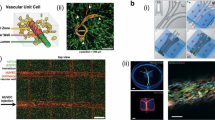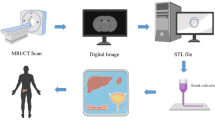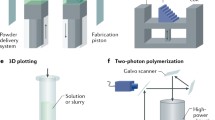
Overview
- Provides strategic insight into the biofabrication of in vitro tissues and organs
- Introduces 3D cell-printing techniques and dECM-based bioinks
- Includes examples of 3D cell printed in vitro tissues/organs
Access this book
Tax calculation will be finalised at checkout
Other ways to access
About this book
Similar content being viewed by others
Keywords
Table of contents (8 chapters)
-
Front Matter
-
Back Matter
Authors and Affiliations
About the authors
Prof. Jinah Jang received her Ph.D. at the Division of Integrative Biosciences and Biotechnology at POSTECH in 2015, and she worked as postdoctoral fellow in the Department of Mechanical Engineering at POSTECH (2015–2016) and the Institute for Stem Cell and Regenerative Medicine/Department of Pathology and Bioengineering at the University of Washington (2016–2017). She joined POSTECH in the spring of 2017 as an assistant professor in creative IT engineering. Her research focuses on the building the functional human tissues from stem cells via 3D bioprinting technology and printable biomaterials, particularly based on tissue-specific bioinks. Her successful achievements may lead to clinical applications for providing advanced therapeutic methods, understanding disease mechanisms, and engineering micro-tissue models.
Dr. Byoung Soo Kim received his Ph.D. in Mechanical Engineering from POSTECH in 2019. During an MS and PhD integrated program at the Department of Mechanical Engineering in POSTECH under the guidance of Prof. Dong-Woo Cho, his research focused on 3D printing system development, dECM-based bioink formulation, and in vitro tissue biofabrication. He is particularly focused on 3D cell printing of in vitro human skin models. He has suggested a novel platform for matured 3D skin constructs by employing a printable functional transwell system, rather than using commercial transwell inserts. Furthermore, he formulated a porcine-skin-derived tissue-specific bioink and applied it to skin tissue engineering. A vascularized and perfusable human skin equivalent composed of an epidermis, dermis, and hypodermis was 3D cell-printed and matured. Based on his previous achievements, heis now working on in vitro skin disease modeling for better pathophysiological studies.
Dr. Ge Gao received his master’s degree from Huazhong University of Science and Technology (HUST) and his Bachelor’s degree from Harbin Institute of Technology (HIT), majoring in Materials Science. Since 2014, he has been a Ph.D. student at the Department of Mechanical Engineering at POSTECH. His current research focuses on 3D cell-printing of vascular constructs and their applications as in vitro vascular platforms and in vivo blood vessel bypass grafts. In addition, he also developed a vascular-tissue-specific bioink that can facilitate the functionalization of the fabricated vascular equivalents. These achievements might be useful for a wide range of biomedical applications, from modeling blood vessel relevant diseases to building vascularized tissues/organs.
Mr. Wonil Han received his bachelor’s degree in Life Science from Handong Global University in 2015. Since then, he has been a graduate student on an MS and Ph.D. integrated program, at the Department of Integrative Bioscience and Biotechnology at POSTECH under the supervision of Prof. Dong-Woo Cho. His research interests include liver tissue engineering and regenerative medicine via 3D cell printing technology, the regulatory effect of dECM bioinks of normal tissues on the fibrotic disease models, and big data analysis of differential stem cell behaviors in dECM bioinks from different kinds of tissues.
Dr. Narendra K. Singh has completed his Ph.D. in Materials Science from the Indian Institute of Technology-Banaras Hindu University (IIT-BHU), India in 2012 and has subsequently joined as a postdoctoral research fellow in the Department of Polymer Science and Engineering, Sungkyunkwan University, South Korea (2013–2015). He is currently a postdoctoral research fellow under prof. Dong-Woo Cho at the Department of Mechanical Engineering, Pohang University of Science and Technology (POSTECH), South Korea. His research interests include biomaterials, proteomics analysis of dECM bioinks, 3D cell-printing technology, and regenerative medicine. In particular, his current research focuses on the 3D cell-printing of microfluidic kidney-on-a-chip for the development of in vitro disease models and drug toxicology advancement. He has published 12 research articles in internationally reputed peer-reviewed journals and two book chapters. His research work has been selected for the cover page of Nanosci. Nanotechnol. Lett, 1: 52-56 (2009), and his work (J. Mat. Chem. 21:15919-15927 (2011) has been highlighted in Nature India.
Bibliographic Information
Book Title: 3D Bioprinting
Book Subtitle: Modeling In Vitro Tissues and Organs Using Tissue-Specific Bioinks
Authors: Dong-Woo Cho, Byoung Soo Kim, Jinah Jang, Ge Gao, Wonil Han, Narendra K. Singh
DOI: https://doi.org/10.1007/978-3-030-32222-9
Publisher: Springer Cham
eBook Packages: Biomedical and Life Sciences, Biomedical and Life Sciences (R0)
Copyright Information: Springer Nature Switzerland AG 2019
Hardcover ISBN: 978-3-030-32221-2Published: 16 December 2019
Softcover ISBN: 978-3-030-32224-3Published: 16 December 2020
eBook ISBN: 978-3-030-32222-9Published: 04 December 2019
Edition Number: 1
Number of Pages: XV, 114
Number of Illustrations: 1 b/w illustrations, 53 illustrations in colour
Topics: Biomedical Engineering/Biotechnology, Biomedical Engineering and Bioengineering, Regenerative Medicine/Tissue Engineering, Mechanical Engineering




